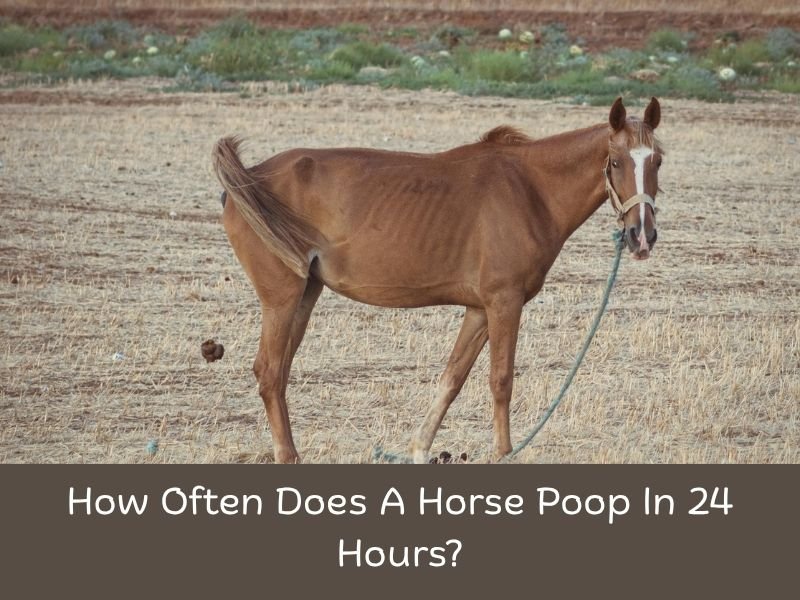Horses are majestic animals known for their strength, grace, and—believe it or not—the frequency with which they relieve themselves. While it may not be the most glamorous aspect of horse ownership, understanding a horse’s manure habits is an essential part of ensuring their digestive and overall health.
A common question among new horse owners is: how often does a horse poop in 24 hours? The answer isn’t just trivia—it’s a vital sign of internal well-being. Let’s explore how often horses defecate, what factors influence this frequency, and why every horse owner should be a bit of a poop detective.
Table of Contents
ToggleAverage Number of Times a Horse Poops in 24 Hours
On average, a healthy adult horse poops 6 to 12 times a day. That translates to about once every 1.5 to 4 hours, depending on the individual horse and its lifestyle. While that may sound like a lot, it’s entirely normal and even necessary, given the way a horse’s digestive system works.
Horses are non-ruminant herbivores with a hindgut fermentation process. This means food travels continuously through their digestive tract, and the large intestine plays a significant role in breaking down fiber. Because their system is always on the move, frequent elimination is part of the deal.
However, this frequency can vary. Here’s what commonly affects how often a horse poops:
-
Age: Foals and young horses may poop more frequently than mature horses.
-
Diet: High-fiber diets often result in more regular bowel movements.
-
Activity level: Exercise can stimulate digestion, increasing frequency.
-
Stress and environment: New surroundings or travel can lead to either an increase or decrease in frequency.
-
Hydration: Water intake plays a critical role in maintaining consistent bowel function.
Veterinary experts from institutions like the American Association of Equine Practitioners (AAEP) emphasize that while the 6–12 range is typical, individual horses can fall outside this range for benign reasons—but abrupt changes should be taken seriously.
What Is Normal Horse Manure Like?
Frequency is just one part of the equation. Equally important is the quality of the manure. Recognizing what’s normal helps identify potential problems before they become serious.
Color and Consistency: Normal horse manure is usually a shade of brown or greenish-brown and appears in soft, formed balls called fecal “apples.” It should be moist but not runny, and not overly dry or hard.
Odor: It should have a mild, earthy smell—not sour, rancid, or excessively strong.
Contents: You shouldn’t see undigested grain, mucus, or large amounts of fiber strands. If you do, it may indicate poor digestion or an imbalance in the diet.
Amount: Horses can produce 35 to 50 pounds of manure per day. This amount is also influenced by diet and overall size.
If manure deviates significantly in color, texture, or content, it might point to digestive upset, parasites, or dietary issues. For more on healthy manure and signs of trouble, see resources like the University of Minnesota Extension’s equine health guide.
Factors That Affect a Horse’s Poop Frequency
While the average poop count offers a helpful baseline, several factors can shift this number up or down. Let’s break down the key influencers.
Diet and Forage Type
A horse’s diet is the most powerful driver of its digestive rhythm. Horses are built to eat small amounts of forage throughout the day—this means grazing on grass or hay. Horses on free-choice forage often poop more frequently than those on scheduled meals.
Fiber increases bulk and stimulates motility in the gut. On the other hand, high-concentrate feeds (like grains) can reduce frequency and even lead to digestive disturbances if not managed carefully.
Additionally, abrupt changes in diet can alter manure habits dramatically. The National Research Council (NRC) recommends transitioning dietary components slowly to help maintain a consistent poop pattern.
Water Intake
Hydration is critical. Dehydrated horses produce less manure, and what they do pass may be dry and difficult to excrete. This can lead to impaction colic, a serious condition requiring veterinary intervention.
Horses should drink 5 to 15 gallons of water per day, depending on their size, activity, and weather conditions. Salt blocks or electrolytes may be necessary to encourage water consumption, especially in hot climates or during travel.
If your horse’s manure appears drier than usual or they’re pooping less frequently, check water availability immediately. The Equine Health & Welfare Alliance recommends monitoring water buckets or automatic waterers daily as part of basic horse care.
Exercise and Turnout Time
Movement plays a big role in keeping a horse’s gut moving. Horses that are stalled for long periods tend to have slower digestion and may poop less frequently.
On the flip side, horses that have regular turnout or are exercised daily often maintain healthier and more consistent bowel habits. The act of walking, trotting, or grazing naturally stimulates intestinal motility.
This is one reason why post-surgery or post-travel care often involves hand-walking—to get the digestive system back on track. According to The Horse – Your Guide to Equine Health Care, even 20–30 minutes of daily movement can support regular bowel function.
Health and Medical Conditions
Digestive frequency can be an early signal of broader health problems. Several conditions can reduce or increase how often a horse poops:
-
Colic: Often causes reduced manure output or none at all. This is a veterinary emergency.
-
Diarrhea: Can result from infections, dietary issues, or stress. Persistent diarrhea requires prompt care.
-
Parasites: Worm burdens can disrupt normal digestion. Regular fecal testing is essential for parasite control.
-
Dental problems: Poor chewing reduces digestion efficiency, potentially changing manure quality and frequency.
Regular checkups, deworming schedules, and dental exams can help prevent these issues before they affect the digestive system.
Poop Monitoring: Why It Matters
Monitoring your horse’s manure may not be the most glamorous part of barn life, but it’s an incredibly useful health check. Manure provides real-time feedback on how your horse’s digestive system is functioning.
By observing and recording your horse’s poop regularly, you can catch early signs of:
-
Dehydration (dry or hard manure)
-
Stress-related changes (frequent, loose manure during travel or shows)
-
Dietary imbalances (undigested feed or excessive fiber)
-
Parasite issues (visible worms or eggs)
Keeping a simple log of manure frequency, consistency, and appearance can help you and your vet track patterns or changes. This is especially important if your horse has a history of colic or gastrointestinal sensitivity.
Professional organizations like The British Horse Society (BHS) recommend checking manure at least twice a day, especially if the horse is stabled, to ensure everything is normal. This kind of attention can prevent small issues from becoming large medical emergencies.
When to Call the Vet
Although variation in poop frequency is normal to an extent, certain warning signs should never be ignored. Contact your veterinarian if you notice any of the following:
-
Sudden decrease in manure output
-
No manure in over 12 hours
-
Excessively dry, hard, or pellet-like poop
-
Diarrhea lasting more than 24 hours
-
Presence of blood, mucus, or worms
-
Strong foul odor or abnormal color (e.g., black, which may indicate internal bleeding)
These signs could be early indicators of colic, impaction, or infection, all of which require prompt medical attention. According to the American College of Veterinary Internal Medicine (ACVIM), digestive emergencies are one of the leading causes of equine hospitalization, and early intervention is key to positive outcomes.
It’s always better to call and be wrong than to delay and regret it.
FAQs About Horse Poop
Can horses poop too much?
Yes and no. If a horse is pooping more than 12 times a day but the manure is well-formed and the horse is otherwise healthy, it’s probably not a cause for concern. However, frequent loose manure, especially paired with weight loss or lethargy, warrants a closer look.
Is it normal for a horse to poop while walking or working?
Yes! Horses can and often do poop while moving. In fact, many working horses (especially during trail rides or in arenas) will defecate while trotting or walking. It’s a normal part of equine physiology and doesn’t indicate illness.
How much manure does a horse produce daily?
A typical adult horse produces 35 to 50 pounds (16 to 23 kg) of manure each day. Over a year, this adds up to over 9 tons of waste! This is why proper manure management is essential on farms and boarding facilities. The University of Nebraska–Lincoln provides great resources for safe and eco-friendly disposal.
Can stress affect how often a horse poops?
Definitely. Travel, new environments, competition stress, or even changes in routine can trigger both constipation and diarrhea in horses. Stress affects gut motility and microbiome balance. Many owners report loose stools when horses are trailered or stabled away from home, especially during show season.
How often should you clean stalls based on how much a horse poops?
Since horses defecate 6–12 times daily, stalls should be cleaned at least once a day, preferably twice, to maintain hygiene and reduce the risk of hoof or respiratory issues. In warmer climates, this also helps reduce flies and odor.
Conclusion
To recap: most healthy horses poop between 6 and 12 times every 24 hours, though this can vary depending on age, diet, activity level, and health status. Manure is more than waste—it’s a window into your horse’s inner health.
By observing frequency, appearance, and changes in manure, horse owners can catch early warning signs of dehydration, digestive upset, or more serious issues like colic. While it may not be the most appealing part of horse care, it’s one of the most important.
Remember: when in doubt, reach out to your vet. A quick call can save your horse from unnecessary suffering—and save you from bigger vet bills down the line.

